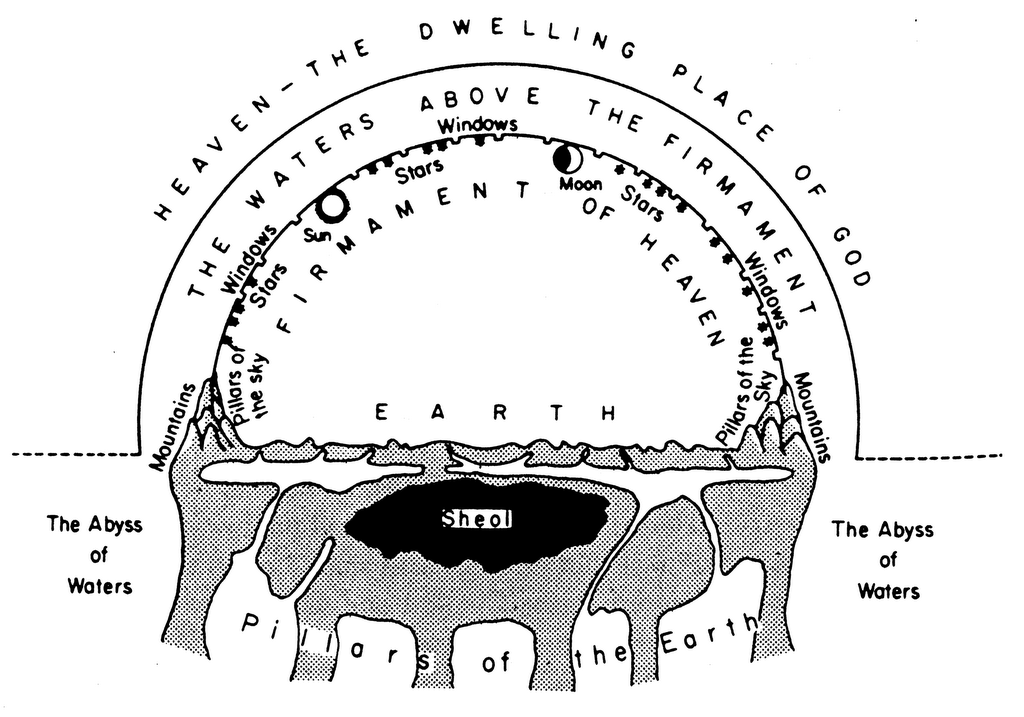
“We are surrounded by such a great cloud of witnesses” – Hebrews 12:1
- March 26, 2013
- / Category Hebrews 12, Resurrection, Witnesses
- / Posted By Kevin Bennett
- / No Comments.
Contents
Who are the Witnesses? Aren’t all those people dead?
 Hebrews 12:1 assures us (the faithful), that “we are surrounded by … a great cloud of witnesses”, referring to the saints whom the whole previous chapter had been listing.
Hebrews 12:1 assures us (the faithful), that “we are surrounded by … a great cloud of witnesses”, referring to the saints whom the whole previous chapter had been listing.
But they’re all dead. What’s with that?
The Witnesses
Chapter 11 lists a procession of Biblical saints from bygone days, who exemplified “faith”, as defined in Hebrews 11:1. Indeed, the important thing about that faith is that “this is what the ancients were commended for” (Hebrews 11:2). The lesson is that we also should exemplify such faith, and be “commended” for it in the same way.
Who “commended” them? I will return to that question later.
But all of the people in chapter 11 were long dead by the time Hebrews was written, in the First or Second Century AD. How can they be said to be “witnesses”? It would make more sense to say that future generations are “witnesses” of this generation. This is how we, in the modern Western world, talk about the environmental question: we invoke the future generations as witnesses of our choices today: “What will our grandchildren say about our present choices?”
That’s not how the Biblical authors think about it.
Where are the dead?
The Bible’s promise is that we will be resurrected. This is important because it incorporates the deep investment that God has placed in our temporal, flesh-and-bone human bodies: We were created in His image, after all!
But that resurrection is said to happen all at once, when Christ returns to gather the faithful and “make all things new”. What about before then?
Sleeping?
Paul writes to the Thessalonians:
we believe that Jesus died and rose again, and so we believe that God will bring with Jesus those who have fallen asleep in him
1 Thessalonians 4:14
He refers to those who have died in this same way elsewhere (1 Corinthians 11:30, 15:6, 15:18, 15:20, 1 Thessalonians 4:15), and Jesus, as recorded by John, uses the same idiom in speaking of Lazarus (John 11:11).
There is a doctrine that gets around called, “Soul Sleep”, which reflects the point of view that those who are dead are asleep. But is that what this idiom means? Or does it refer to the fact that a dead person appears to be sleeping, and hence this term became a more gentle way of saying “dead”?
I mean, when talking about their late Granny, people will often say she “has passed on”, or “passed away”. It would seem that “asleep” might be the ancient Greek equivalent expression.
Immediately translated?
Jesus says to the thief on the cross, “truly I tell you, today you will be with me in paradise”. This is normally seen as contradicting the reference to “asleep” used in the above examples. Which is it? Asleep, or “in paradise”?
Tom Wright says that “Paradise” is a “regular Jewish way of referring, not to the final destination of God’s people, but to the temporary place of rest before the rising again of the dead”. To the Jewish mind, this is a place of longing for the fullness of a bodily life once again.
Ancient Contemplation of the Afterlife
In ancient times, the faithful contemplated the afterlife, but didn’t have much information to go on. They considered it “down”, under the earth, and named it “sheol”, which is also the word for “grave”. There are hints at people being awake in this afterlife, such as:
So they with all that belonged to them went down alive into Sheol; the earth closed over them, and they perished from the midst of the assembly.
– Number 16:33
The Lord kills and brings to life; he brings down to Sheol and raises up.
– 1 Samuel 2:6
O that you would hide me in Sheol, that you would conceal me until your wrath is past, that you would appoint me a set time, and remember me!
– Job 14:13
O Lord, you brought up my soul from Sheol, restored me to life from among those gone down to the Pit.
– Psalm 30:3
But God will ransom my soul from the power of Sheol, for he will receive me. Selah
– Psalm 49:15
Let death come upon them; let them go down alive to Sheol; for evil is in their homes and in their hearts.
– Psalm 55:15
like Sheol let us swallow them alive and whole, like those who go down to the Pit.
– Proverbs 1:12
Sheol beneath is stirred up to meet you when you come; it rouses the shades to greet you, all who were leaders of the earth; it raises from their thrones all who were kings of the nations.
– Isaiah 14:9
I said: In the noontide of my days I must depart; I am consigned to the gates of Sheol for the rest of my years.
– Isaiah 38:10
I made the nations quake at the sound of its fall, when I cast it down to Sheol with those who go down to the Pit; and all the trees of Eden, the choice and best of Lebanon, all that were well watered, were consoled in the world below.
– Ezekiel 31:16
The mighty chiefs shall speak of them, with their helpers, out of the midst of Sheol: ‘They have come down, they lie still, the uncircumcised, killed by the sword.’
– Ezekiel 32:21
Shall I ransom them from the power of Sheol? Shall I redeem them from Death? O Death, where are your plagues? O Sheol, where is your destruction? Compassion is hidden from my eyes.
– Hosea 13:14
In some of these cases (and many more that I haven’t placed here), the reference to “sheol” can be taken to mean distress in temporal life. In those cases it certainly doesn’t prove that people literally believed in this afterlife concept, but in many other cases it is obvious that they did.
Saul called-up Samuel from sheol in 1 Samuel 28. It is unmistakable as a reference to the ongoing existence of Samuel after death.
Abrahamic Afterlife?
In the parable of Lazarus (not the same Lazarus as Jesus’ friend of the same name) and the Rich Man (Luke 16:19-31), both characters die. Lazarus finds himself at Abraham’s side (literally, “bosom”), which is understood to be a very good place to be, and the rich man is in torment. A conversation ensues.
It is important to note that this is not depicting the resurrection. In fact, it’s not directly compatible with the New Testament picture of life-after-death. It is suggested by many Bible scholars that Jesus is retelling a well known Jewish fable, which probably simply made a point about being charitable in life in light of what the afterlife might hold. Jesus was changing the punch line to one about believing God’s promises, with specific reference to his own Resurrection.
He said to him, “If they do not listen to Moses and the prophets, neither will they be convinced even if someone rises from the dead.”
– Luke 16:31
Adapting stories is not an unusual technique for Jesus (and probably for other rabbis). Another example of the same method is the variety of ways in which Jesus adapts the Isaiah 5 metaphor of the vineyard, using it in a variety of clever ways to make his point at various times, such as in Luke 13:1-9, which I look at in detail in another blog post.
In other words, Jesus is not making the point that this will be what the afterlife is like. His point is that there is sufficient information in the Scriptures about being charitable that the rich man character cannot even claim ignorance. In fact, his own rising from the dead should not even be necessary as a witness to God’s will! It also has much to do with inverting the contemporary expectations around “social status” and “God’s favour” (so Green, in “The Gospel of Luke”, p603).
Souls under the altar
In Revelation 6 (before the Resurrection of Revelation 20), we start to hear about those who have died for their faith:
When he opened the fifth seal, I saw under the altar the souls of those who had been slain because of the word of God and the testimony they had maintained. They called out in a loud voice, “How long, Sovereign Lord, holy and true, until you judge the inhabitants of the earth and avenge our blood?” Then each of them was given a white robe, and they were told to wait a little longer, until the full number of their fellow servants, their brothers and sisters, were killed just as they had been.
– Revelation 6:9-11
Quite specifically, these souls are speaking before the general Resurrection of chapter 20, and they explicitly have not yet been avenged (that happens in Revelation 19:2). Also, the narrative places this during the opening of the “seals”, and we can see in that narrative that there are still people running around in the world experiencing a terrible time of tribulation as the subsequent seals are opened. The Resurrection has not happened.
In chapter 7, 144,000 people are marked out with a seal so that they will not be harmed in the judgement, but all the others, a “great multitude that no one could count, from every nation, tribe, people and language” (Revelation 7:9), who are killed for their faith in “the great tribulation” (Revelation 7:14), join the angels in the throne room of God. The Resurrection has not happened.
Chapter 20 summarises this as “The First Resurrection”:
They came to life and reigned with Christ a thousand years. (The rest of the dead did not come to life until the thousand years were ended.) This is the first resurrection.
– Revelation 20:4-5
The narrative continues, getting to the “second Resurrection” only later in verse 12 and following.
So then, the dead are not sleeping.
Who commended the saints?
In Hebrews 11:39, it says, “they were commended for their faith”. By whom were they commended? By God? By angels? By the deceased saints?
I suggest that the answer is that they were commended by Scripture for their faith. And this Scripture is God’s Scripture, so that the commendation is understood to be divine. They were not all commended in their lifetime, but the Scripture bears witness to them in a positive light, as exemplars of the faith. The Scriptures are “God breathed” (2 Tim 3:16), and the Law of Moses was given “through the angels” (Acts 7:53, Gal 3:19, Hebrews 2:2), so this is authoritative. In any case, the scriptures belong to the people of God, so what the scriptures commend is commended by the faithful community.
What are the saints up to?
These saints are waiting.
They are awaiting the Final Judgement, at which they will be resurrected. At that time they will be vindicated in their faith. Until then, they are in the same plight as the “souls under the altar”, and similarly in a state of expectant anticipation.
In the mean time, they bear witness to our lives. Their stories stand as silent witnesses, but they also personally watch on as we live. They are, in a sense, “the audience”.
I have elsewhere described another audience, as being located in the angels: The Angels at Christmas time: What’s with that? Jesus said that those who rise from the dead are “like the angels” (Matt 22:30; Mark 12:25), but didn’t talk about those awaiting the Resurrection. In any case, angels don’t come from dead people. Angels are created creatures, as are people. We therefore have this enormous, combined audience of all the deceased saints, all the angels, and God Himself.
The Cloud of Witnesses
Therefore, since we are surrounded by so great a cloud of witnesses, let us also lay aside every weight and the sin that clings so closely, and let us run with perseverance the race that is set before us, looking to Jesus the pioneer and perfecter of our faith, who for the sake of the joy that was set before him endured the cross, disregarding its shame, and has taken his seat at the right hand of the throne of God.
– Hebrews 12:1-2
We are to know ourselves “surrounded” by these living witnesses. We have an audience, made up not only of God HImself, and all the angels, but also of human beings, who have striven and have attempted this life of faith. This audience is willing us on! We might well imagine a kind of “studio audience” on a massive scale, which says, “Ooooooh!”, and “Hurrah!”, and laughs and cries as our story unfolds.
The mere fact of this audience should strengthen us. It should keep our eyes fixed on that man, that Son of God, who endured and overcame. We should know their companionship, their encouragement, their deep yearning for justice, and their advice about “faith”.
We truly are surrounded by a great cloud of witnesses.
Related
facebook comments:
Recent Posts
- Addiction: How to Help
- … and this just in: News from the Streets of Ipswich. Issue 23
- What Happens When We Die, and Where are my Loved Ones?
- Seeking the Kingdom
- If it is by the Spirit of God that I drive out demons, then the Kingdom of God has come upon you – Matt 12:28
Tags
| S | M | T | W | T | F | S |
|---|---|---|---|---|---|---|
| « May | ||||||
| 1 | 2 | 3 | 4 | 5 | 6 | |
| 7 | 8 | 9 | 10 | 11 | 12 | 13 |
| 14 | 15 | 16 | 17 | 18 | 19 | 20 |
| 21 | 22 | 23 | 24 | 25 | 26 | 27 |
| 28 | 29 | 30 | ||||





